Louisiana Criminal Defense Attorney David E. Stanley, APLC
Table of Contents
Toggle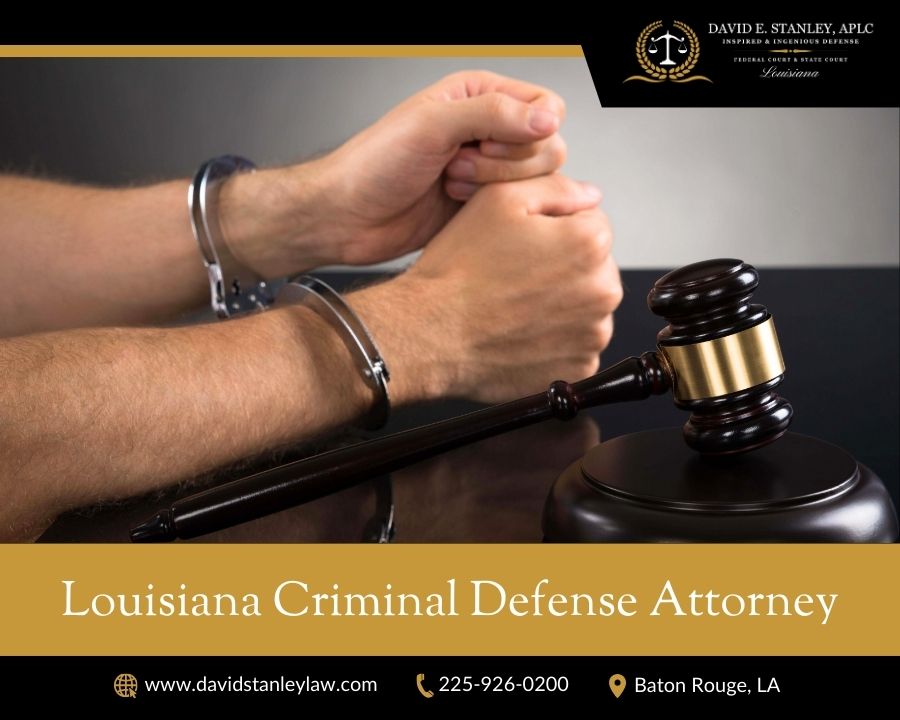
Louisiana criminal law is a complex area of the law that requires careful consideration and analysis of the facts and applicable law. A felony conviction in Louisiana can cost you more than your money and freedom. A conviction can follow you throughout your life. A successful criminal trial lawyer must master, and creatively apply, the substantive criminal law, constitutional law, the rules of evidence, and the rules of criminal procedure, while hammering away at the prosecutor’s case and managing the dynamics of the trial in the courtroom. The stakes are often very high and the consequences of a conviction or guilty plea for the accused are occasionally life altering. Louisiana Criminal Defense Attorney
There are often complicated procedures, obscure factual details, and complex laws involved in a criminal case that are not readily apparent to, or easily understood by, someone who is not trained in the law. Important legal rights may go unprotected, unasserted, or waived and lost forever, because the accused person is unaware of them, does not fully understand them, does not fully appreciate the consequences of failing to timely assert them or the consequences of waiving them. Why should you, or your loved one, face serious criminal charges alone when you can have a knowledgeable criminal defense attorney with you every step of the way fighting to defend you and protect your legal rights.
Are you under criminal investigation? Are you the target of a grand jury? Have you received a grand jury subpoena seeking the production of your business or personal records. Have you been arrested? Have you been contacted by the police asking you to come meet with them to give a statement? Have you been indicted? Have you been charged with a crime in a bill of information?
If you answered “YES” to any of these questions, then you have an urgent need to retain a highly qualified, skilled and experienced criminal trial attorney. Before you make any statements, or produce any documents, you need the guidance, expertise, and assistance of a distinguished criminal trial attorney. Please, do not make any statements to law enforcement agents, do not voluntarily consent to a search of your property, unless they have a valid search warrant, and do not voluntarily produce any documents, books, or records without being served with a subpoena. Even if you are served with a subpoena for your records, contact and retain a lawyer to help you prepare your response to the subpoena before you respond or provide any documents in response to the subpoena.
Most importantly, you need to take immediate action to retain a competent criminal defense attorney who will make sure that you understand your constitutional and statutory rights, you are aware of the options available to you, and you have a lawyer skilled in crafting a rock solid defense case fighting for you every step of the way.
Overview of Louisiana Criminal Law
If you are facing criminal charges in Louisiana, there are several terms and concepts that you need to understand in order to make informed decisions about your case. Louisiana criminal statutes are given a genuine construction by our courts, according to the fair import of the words in the statute, taken in their usual sense and in connection with the context, and with reference to the purpose of the statute. Our courts consider the text of a statute to be the best evidence of the legislative intent or will. Louisiana Criminal Defense Attorney Louisiana Criminal Defense Attorney
Felony or Misdemeanor?
First, is the crime that you are charged with committing a felony or misdemeanor? A felony is defined in Louisiana Revised Statute 14:2(4) as any crime for which an offender may be sentenced to death or imprisonment at hard labor. So, any crime for which the penalty is death, imprisonment at hard labor, or imprisonment with or without hard labor is a felony. A felony is the most serious classification of crime and a conviction will result in the loss of your right to vote, own or possess a firearm, and some of your other most basic rights as a citizen. Examples of felony crimes include first degree murder, second degree murder, manslaughter, rape, sexual battery, molestation of a juvenile, human trafficking, possession with intent to distribute controlled dangerous substances, creation or operation of a clandestine laboratory for the unlawful manufacture of controlled dangerous substances, arson, kidnapping, armed robbery, carjacking, and home invasion.
A misdemeanor is defined as any crime other than a felony. A crime for which the sentence does not include any possibility of imprisonment at hard labor is a misdemeanor. Examples of misdemeanor crimes are simple assault, simple battery, disturbing the peace, misdemeanor sexual battery, resisting an officer, simple criminal damage to property where the damage is less than $1,000, criminal mischief, criminal trespass, hit-and-run driving where there is no death or serious bodily injury, and first offense driving while intoxicated.
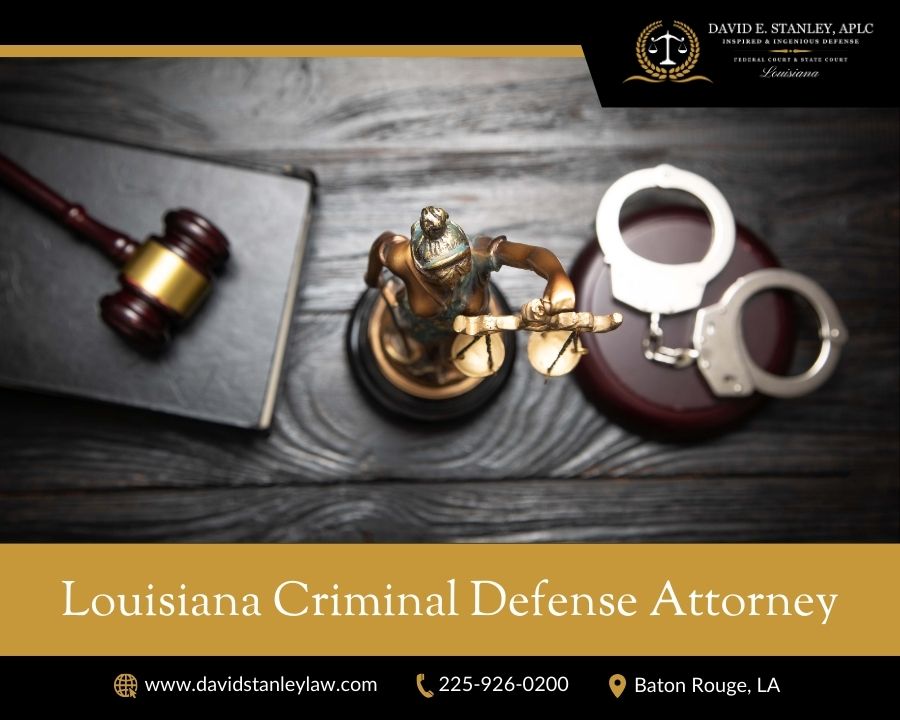
Intentional, Reckless or Negligent Conduct?
Does the crime require that you have criminal intent or does it only require that you engage in reckless or negligent conduct? Louisiana Criminal Defense Attorney
According to Louisiana law, criminal intent may be specific or general. Specific criminal intent is that state of mind which exists when the circumstances indicate that the offender actively desired the prescribed criminal consequences to follow his act or failure to act. Specific criminal intent may be inferred from the circumstances. So, for example, pointing a firearm at a person and discharging it at close range would give rise to an inference that the person who fired it had the specific intent to kill or cause great bodily harm to the individual.
General criminal intent is present whenever there is specific intent. General criminal intent is also present when the circumstances indicate that the offender, in the ordinary course of human experience, must have adverted to the prescribed criminal consequences as reasonably certain to result from his act or failure to act. In some cases, for some crimes, merely doing the prohibited act itself is sufficient to establish the offender’s general intent to commit the crime. In the absence of qualifying provisions in a particular statute, the terms “intent” and “intentional” refer to general criminal intent.
Reckless conduct, is not intentional, but is careless, inattentive, or indifferent to consequences, under circumstances involving danger to life or the safety of others, although no harm was intended. In Louisiana criminal law, criminal negligence exists when, although neither specific nor general criminal intent is present, there is such disregard of the interest of others that the offender’s conduct amounts to a gross deviation below the standard of care expected to be maintained by a reasonably careful man under the same circumstances. Generally, intentional criminal acts are punished more severely than reckless acts or criminally negligent acts.
The Presumption of Innocence
The Louisiana Constitution provides that every person charged with a crime is presumed innocent until proven guilty. According to Louisiana law, in all cases, the court must charge the jury that a person accused of crime is presumed by law to be innocent until each element of the crime, necessary to constitute his guilt, is proven beyond a reasonable doubt. The jury hearing the case has the duty, in considering the evidence, and in applying the law as given by the court to that evidence, to give the defendant the benefit of every reasonable doubt arising out of the evidence or out of the lack of evidence in the case. If the jury is not convinced of the guilt of the defendant beyond a reasonable doubt, it is the duty of the jury to find him not guilty.
The Burden of Proof
In a criminal trial, the prosecutor has the burden of proving the defendant’s guilt beyond a reasonable doubt. This means that the defendant does not have the burden of proving that he did not commit the charged crime. Most crimes consist of several elements and each element of the crime must be proven by the prosecutor beyond a reasonable doubt to convict the defendant. The defendant has the right to remain silent and he or she can not be compelled to testify against himself or herself.
If a defendant is asserting an affirmative defense, such as insanity at the time of the offense, the defendant does have the burden of proving his or her insanity at the time of the offense by a preponderance of the evidence.
Guilt Beyond a Reasonable Doubt
The reasonable doubt standard is a foundational precept of our adversarial system of justice. The constitutional right to due process of law protects the defendant against conviction except upon proof beyond a reasonable doubt of every fact necessary to constitute the crime with which he is charged. The accused’s right to jury trial is denied when a trial judge gives a constitutionally deficient beyond-a-reasonable-doubt instruction because the constitution requires proof of the accused’s guilt beyond a reasonable doubt and the accused’s trial under those circumstances does not produce the required verdict. Thus, the United States Supreme Court has ruled that a constitutionally deficient reasonable-doubt instruction is a structural error in the trial that cannot be harmless error.
Can The Charge Be Quashed?
According to Louisiana law, all pleas or defenses raised before trial, other than mental incapacity to proceed, or pleas of “not guilty” and of “not guilty and not guilty by reason of insanity,” are properly raised or urged by a pretrial motion to quash. The Louisiana Supreme Court has described claims raised via a motion to quash as “pleas which do not go to the merits of the charge,” and as “procedural matters” wherein “the question of factual guilt or innocence is not before the court.” As a general rule, the fact that the defendant may have a good defense is not a sufficient grounds for a motion to quash the indictment or bill of information. However, the Louisiana Supreme Court has recognized a very narrow exception to the general rule “for cases in which the state cannot establish an essential element of the offense under any set of facts conceivably provable at trial.” All issues, whether of law or fact, that arise on a motion to quash are tried and decided by the court without a jury.
Some examples of the recognized grounds that would support a motion to quash include that he indictment does not charge an offense which is punishable under a valid statute; or the indictment is duplicitous; or the indictment contains a misjoinder of defendants or offenses; or trial for the charged offense would constitute double jeopardy; or the time limitation to institute prosecution, or to commence the trial, has expired; or the court has no jurisdiction of the offense charged.
Do You Have Any Affirmative Defenses
An affirmative defense raises factual or legal matters which, assuming that the charge in the indictment or bill of information is true, constitute a valid defense to that charge. Examples of affirmative defenses include infancy, insanity, intoxication, mistake of fact, mistake of law, justification, including self defense, and the defense of others.
So, for example, a person accused of second degree murder may raise insanity as an affirmative defense. Typically, this is done by a dual plea of not guilty and not guilty by reason of insanity. If the prosecution were unable to prove all of the elements of second degree murder during the trial, the judge or jury could return a not guilty verdict.
However, with respect to the affirmative defense of insanity, the defendant is admitting that a second degree murder occurred but contends that he is not criminally responsible for it because he was insane (i.e. unable to distinguish between right and wrong) when the offense occurred. Thus, as a practical matter, it can be difficult and somewhat inconsistent for a defendant to try to argue to a judge or jury that he was not guilty and that he was insane at the time of the offense.
Know Your Rights
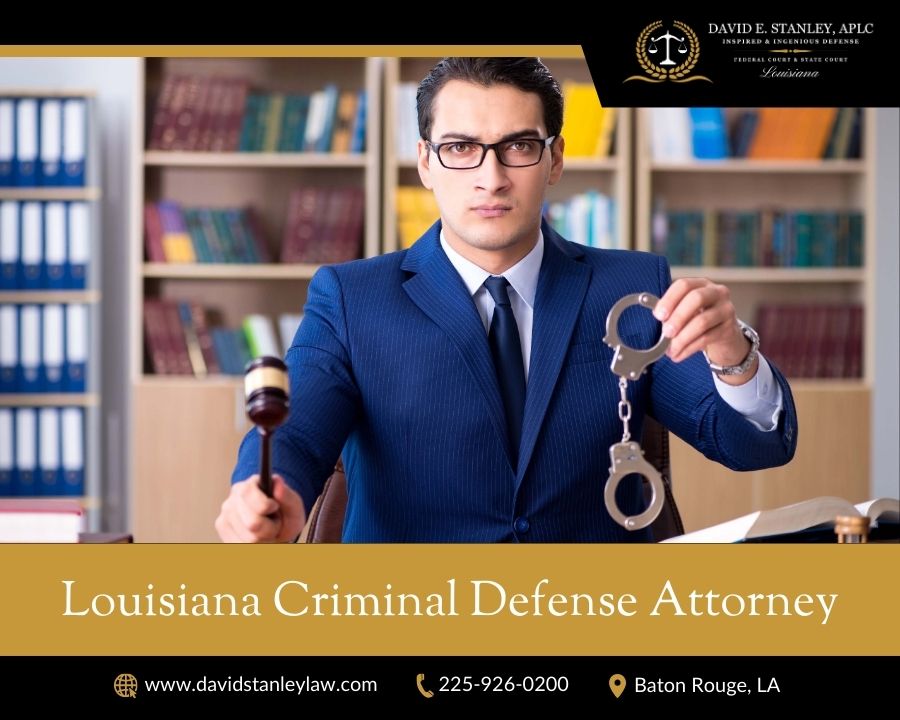
The Right to Remain Silent:
To protect yourself, and maximize your chances for a favorable outcome, you must both understand, and act to protect and preserve, your constitutional and statutory rights. Without proper guidance from a qualified criminal defense lawyer, you may inadvertently waive or relinquish important constitutional rights and significantly reduce your chances of mounting a successful defense.
What are some of the rights granted to a criminal defendant?
At all times, the accused has the right to remain silent and the right not to incriminate himself. Under the Fifth Amendment, a defendant cannot be compelled to testify at trial against himself. However, if granted immunity from prosecution, a person may be compelled by court order to testify in a criminal case.
The Right To Counsel:
In a felony case, the accused has the right to counsel of his choice during all critical stages of the proceedings. If the accused is indigent, and unable to afford counsel, the court must appoint a lawyer, usually the public defender, to represent the defendant.
The right to counsel attaches as soon as judicial proceedings begin, which usually is at the arraignment. Also encompassed within the right to counsel is the defendant’s right to self representation during his criminal trial, which requires a judge’s approval. Sometimes, particularly if the charged offense is very serious, the court will appoint standby counsel to be available to assist a defendant that is representing himself or herself during the trial.
The Right to a Speedy Trial:
Defendants should not be forced to defend themselves in a case in which the delay in bringing the case to trial has damaged or harmed their defense of the case. The constitution and the Louisiana Code of Criminal Procedure both protect a defendant’s right to a speedy trial. Whether a defendant will be successful in having his case dismissed due to a violation of his right to a speedy trial will depend on the particular facts and circumstances of each individual case.
The Right to a Public Trial:
In an effort to make sure that every defendant receives a fair and reasonable trial, the Louisiana Constitution provides that every person charged with a crime is guaranteed the right to a public trial in the parish where the crime, or an element of the crime occurred, unless the venue is changed in accordance with law. This means that the accused has the right to have a public trial so that his or her family and friends, the family and friends of the victim, interested members of the community, and the media may be present to observe the trial proceedings.
The Right To A Jury Trial:
In felony cases, the accused has the right to a jury trial in the parish where the crime was committed. In all cases, except capital cases, the defendant may knowingly and intelligently waive his right to a trial by jury. But, he must do so no later than forty-five days prior to the trial date. The waiver of the right to a jury trial is irrevocable.
During a jury trial, the accused has the right to full voir dire examination of prospective jurors and to challenge jurors peremptorily. The jury will be composed of either twelve jurors or six jurors depending on the punishment that may be imposed on the defendant should he be convicted. In cases in which the punishment may be capital, or is necessarily confinement at hard labor, the jury must be composed of twelve jurors. Cases in which the punishment may be confinement at hard labor are tried before a jury composed of six jurors. All jury verdicts must now be unanimous.
The Right to Confront and Cross-Examine Witnesses:
The defendant has the constitutional right to confront and cross-examine the witnesses against him. With some limited exceptions, the right to confront the witnesses typically means that the witness must testify in open court in the presence of the defendant. Under certain circumstances, and after meeting certain requirements, child witnesses in sex crimes cases may be allowed to testify via close circuit television, so that the child is not re-victimized, traumatized or intimidated by having to testify in the presence of their alleged attacker or abuser.
Learn More About: Public Corruption by David E. Stanley, APLC
Public Corruption
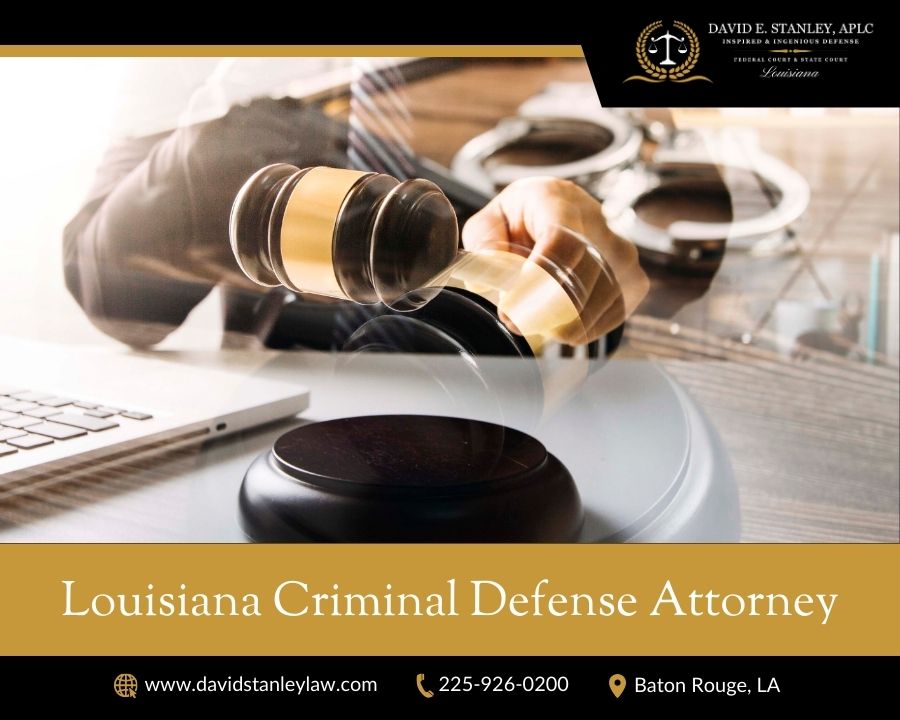
The Right to Testify
If the defendant wants to testify during the trial, he or she has the right to do so. But, he or she can not be compelled to testify against themselves if they do not want to testify during the trial. Whether to testify during the trial is one of the most important decisions that a person accused of a crime will make and may have the most forceful and direct impact on the outcome of the case. A decision regarding whether or not to testify in a particular case should consider a number of important factors, should be made after careful consideration, and only after consultation with a qualified and experienced defense attorney.
Defend Yourself and Your Reputation With Assistance
From David Stanley Today!
Call 225-926-0200 Now!
Frequently Asked Questions
What is Criminal Intent?
Criminal intent is either general or specific. General criminal intent is present whenever there is specific intent, and when the circumstances indicate that the offender, in the ordinary course of human experience, must have adverted to the prescribed criminal consequences as reasonably certain to result from his act or failure to act.
Specific criminal intent is that state of mind which exists when the circumstances indicate that the offender actively desired the proscribed criminal consequences to follow his act or failure to act. The determination of whether the requisite intent is present is a question for the judge or jury as the trier of fact in the case. Specific intent need not be proven as a fact, but may be inferred from the circumstances and the actions of the defendant. For example, firing a handgun at close range while aiming it at a person indicates that the offender had the requisite specific intent to kill or inflict great bodily harm upon that person.
What Should I Do If I Am Arrested And Charged With A Felony?
First, do not try to talk your way out of trouble. You should immediately invoke and exercise your constitutional right to remain silent by telling law enforcement officers that you are not answering any questions without your attorney present with you. Once you invoke your right to remain silent, then do just that: remain silent. Do not volunteer any information or make any oral or written statements to law enforcement officers. Do not agree, or give your consent, to allow them to search your home, office, motor vehicles, or other personal or business property. Do not voluntarily provide them with any documents, books, or records, without a valid search warrant.
Next, you should immediately contact and retain the services of an experienced criminal defense attorney to formulate your defense. If you are served with a grand jury subpoena for your records, take it to your criminal defense attorney before you respond and let your attorney assist you in preparing your response to the subpoena.
What Is Entrapment and Is It A Legitimate Defense?
In certain situations, entrapment is a legitimate defense that may be raised by the defendant. The design and purpose of the entrapment defense is to deter law enforcement officers from planting criminal ideas in innocent minds and promoting crimes which would not otherwise have been committed by the defendant. But, it is not entrapment, if the officers, or agents, merely furnish a defendant who is predisposed to commit the crime with the opportunities to do so. The Louisiana Supreme Court has recognized and stated that: “In entrapment cases, a line must be drawn between the trap for the unwary innocent and the trap for the unwary criminal.”
The entrapment defense is available when a law enforcement officer, or an undercover agent acting in cooperation, for the purpose of obtaining evidence of a crime, originates the idea of the crime and then induces the defendant to engage in conduct constituting the crime, when the defendant is not otherwise inclined or disposed to do so. The entrapment defense has two elements. First, there must be an inducement by a state agent for the defendant to commit the criminal offense. Second, the defendant’s lack of predisposition to commit the criminal offense.
The defendant bears the burden of proving the entrapment defense by a preponderance of evidence, which means that the evidence, taken as a whole, shows the facts pertaining to the entrapment defense are more probable than not. For the defendant to meet his burden of proof of entrapment, he must prove that a state agent induced him to commit a crime. If the defendant meets his burden of proof, the state must prove beyond a reasonable doubt that the defendant was predisposed to commit the crime prior to the government’s involvement in inducing him to commit the crime.
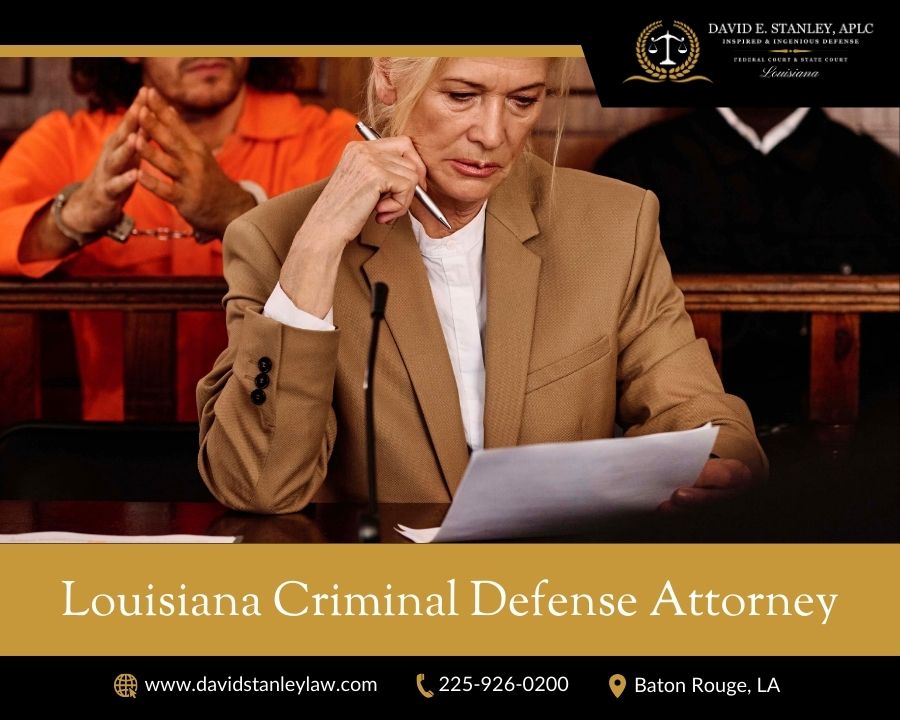
Dedicated Representation With A Reputable Louisiana Criminal Defense Lawyer
Are you facing criminal charges?
Get David Stanley Working On Your Defense Today!!!
David Stanley has almost forty years of experience representing clients in the federal and state courts of Louisiana. He is dedicated to providing high quality legal services to each client by utilizing cutting edge investigative, evidence gathering, and research tools. Effective criminal defense requires careful attention to detail and sound legal analysis of all of the unique aspects of each case including:
1. The validity of the scientific testing and analysis procedures employed by law enforcement agents to collect, test, and analyze DNA and other physical evidence to make sure that junk science is not being utilized against you in the courtroom;
2. The quality, reliability, and relevance, or the lack thereof, of the evidence that the prosecutor will try to use to convict you;
3. The credibility and veracity of the witnesses against you, including any bias, ill will, improper inducements, immunity agreements, or financial or other motives that they might have to testify against you;
4. A clear and complete understanding of the facts and circumstances surrounding the offense for which you have been charged;
5. The soundness and validity of the legal theories and strategies employed by the prosecution.
6. The availability and viability of the affirmative defenses that may be available to you in defending the case against you;
7. Careful review, evaluation, and exposure of any weaknesses in the prosecution’s case that may alter the outcome of the criminal case against you.
8. The need to identify and retain expert witnesses to assist in the preparation of your defense or to testify on your behalf during your trial. Louisiana Criminal Defense Attorney
Looking for A Criminal Defense Attorney? David Stanley, APLC is a seasoned and trusted Louisiana criminal defense attorney who can help and guide you through your legal battle. We serve the following areas:
Criminal Defense Attorney Ascension Parish, LA
Criminal Defense Attorney Baker, LA
Criminal Defense Attorney Baton Rouge, LA
Criminal Defense Attorney Central City, LA
Criminal Defense Attorney East Baton Rouge Parish, LA
Criminal Defense Attorney East Feliciana Parish, LA
Criminal Defense Attorney Greenwell Springs, LA
Criminal Defense Attorney Iberville Parish, LA
Criminal Defense Attorney Lafayette Parish, LA
Criminal Defense Attorney Livingston Parish, LA
Criminal Defense Attorney Pointe Coupee Parish, LA
Criminal Defense Attorney Pride, LA
Criminal Defense Attorney St. Tammany Parish, LA
Criminal Defense Attorney Tangipahoa Parish, LA
Criminal Defense Attorney West Baton Rouge, LA
Criminal Defense Attorney West Feliciana Parish, LA
Criminal Defense Attorney Zachary, LA
David E. Stanley, APLC
1055 Laurel Street Suite 2
Baton Rouge, LA 70802
(225) 926-0200

